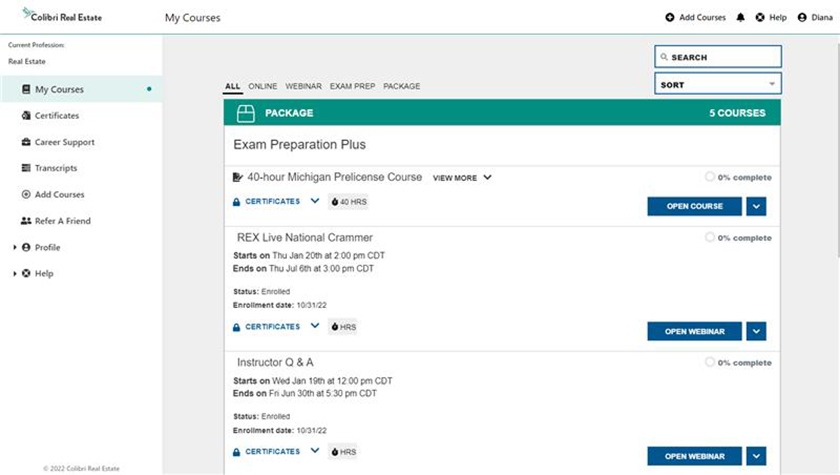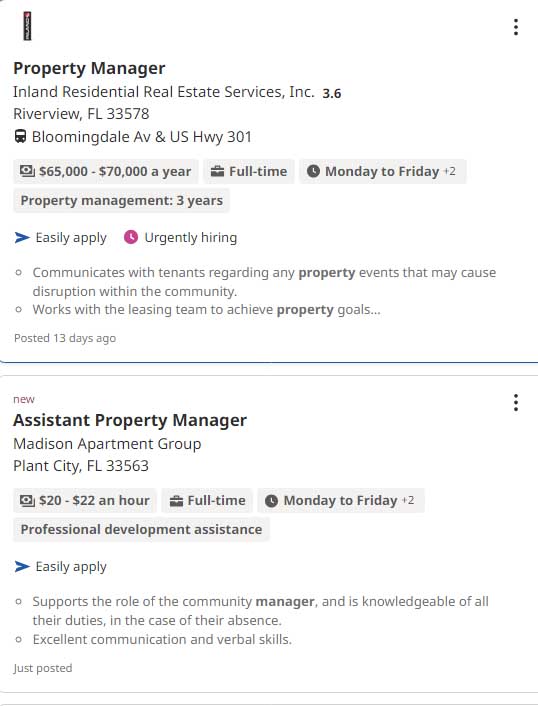A property manager is a lucrative career that is a great alternative to being a real estate agent. To become a property manager, there are several requirements, like being at least 18 years old or older, having a high school diploma or GED, and obtaining your real estate license. However, there are also additional steps, like getting a property management certification, that will give you a competitive edge when applying for jobs. Read on to learn more about the requirements and the steps on how to become a property manager
Property managers are real estate experts who oversee a rental home on the owner’s behalf. They are responsible for duties like collecting rent, renting out vacant properties, maintaining properties, and conducting evictions. For an in-depth discussion about what a property manager does, read our What Does a Property Manager Do & How Much Do They Cost? article.
1. Know the Legal Requirements To Become a Property Manager
Before obtaining a license or certification, you should meet the legal requirements for age, education, and licensing education. It’s essential to look into your state’s rules that stipulate the criteria for property managers before you pursue any further study or begin looking for employment. Although a higher degree is unnecessary to become a property manager, most states have the following requirements:
- Age: Property managers need to be at least 18 years old or older, but in some states, you must be at least 21 years old to be a property manager.
- Education: A high school diploma or GED is typically the minimum educational qualification for a property manager. Although it is unneeded, some people who want to work as property managers pursue an associate or bachelor’s degree in a relevant subject, such as business administration or real estate.
- Licensing: Most states require you to obtain your real estate license to become a property manager. This includes completing the prelicensing coursework and passing a licensing exam in the state.
2. Confirm the Licensing Requirements in Your State
Although higher education is not required, most states require property managers to become licensed real estate agents. Each state has unique criteria for real estate professionals defined by the state, from initial licensure through license renewal. Typically, property managers need to have a real estate license because they perform real estate contract-related duties like negotiating leases or rental agreements or leasing properties.
However, some states have exemptions to the requirements for a real estate license. Some property management service items, such as helping the owner select tenants, administrative and clerical tasks, budgeting, setting rent amounts, regular property upkeep and maintenance, collecting rent, and holding security deposits, will not require a license. Also, if the property manager is under the supervision of a licensed agent or broker, they may be exempt from the licensing requirements.
Click on your state below to see if your state requires a real estate license to become a property manager and, if so, what the requirements are to get a license.
Confirm the Licensing Requirements in Your State

Screenshot of Colibri Real Estate’s interface (Source: Colibri Real Estate)
Colibri Real Estate is an accredited school for agents searching for flexible course options and engaging online components. Along with two federal and three state final exams, it provides enrollment assistance and an exam preparation program that enables you to take up to 10 personalized practice exams. Every practice test and final exam comes with a topic-by-topic evaluation of your score, answers, and explanations, allowing you to assess and retain more of the information provided through the courses.
Visit Colibri Real Estate
Use Promo Code: FSB30 for 30% off
Read how our experts feel about this real estate school in our Colibri Real Estate review.
3. Gain Entry-level Experience in Real Estate
Many property managers have some experience in real estate, like working at a brokerage or a property development company. This will teach you how the market works, help you hone your communication skills, and enable you to build relationships in the field. Some options for how to gain experience in real estate are the following:
- Internship: This opportunity allows you to experience what it’s like to work in the real estate investing industry. You’ll engage directly with professionals in the field and real-world situations and gain valuable information, relevant experience, and networking connections.
- Join professional organizations: Joining real estate organizations, like the National Association of Realtors, will help you build a network, gain tips, learn new skills, and find learning opportunities.
- Get a full- or part-time job: Starting a job in any real estate-related role, such as an agent, leasing manager, administrative assistant, or transaction coordinator, will provide on-the-job training and help you strengthen your abilities.
Search for “real estate” on job boards, such as Indeed or LinkedIn, to see what’s available. Even if it’s not exactly property management, working in the real estate field will get you a step closer to your goal of becoming a property manager.
4. Obtain Property Management Certifications
While your state government issues licenses, national professional associations and trade organizations in the real estate and property management industries issue certificates. For instance, you can obtain certifications from the National Association of Residential Property Managers (NARPM) or the Institute of Real Estate Management (IREM).
Although certification is not required for property managers, it can give you a competitive edge when applying for property management jobs. Moreover, it pays to work toward several different designations as your career develops. Here are the four levels of certification you can pursue:
- Certified Apartment Leasing Professional (CALP): This is open to new property managers who want to gain the expertise and skills necessary to succeed in the real estate industry.
- Certified Apartment Manager (CAM): This is for more seasoned property managers who wish to concentrate on managing apartment properties or become apartment managers.
- Certified Property Manager (CPM): This is also available to property managers with experience handling various residential, commercial, and industrial properties.
- Master Property Manager (MPM): This is the highest certification available for a property manager, requiring at least five years of consistent property management experience.
5. Become Familiar With Property Management Software
Learning how to use online property management software helps property managers stay on top of their duties and responsibilities. The best property management software includes multiple features, including listing syndication, maintenance management, accounting reporting, tenant screening, and online rent collecting. Property management software also provides mobile apps with owner and tenant portals, making communication more easily accessible and efficient.
To find out more about the top online providers of property management software that offer the best features at a reasonable cost, see the table below:
Software | ||||
|---|---|---|---|---|
Best for | Free property management software for up to 75 units | Independent landlords seeking comprehensive property management services | Property management firms handling up to 5,000 units | Most affordable paid subscription plan for property owners |
Key Features |
|
|
|
|
Monthly Starting Price | Free; paid plans start at $12 | Free; paid plan costs $7 per unit | $52 | Free; paid plans start at $8.25 |
Learn More |
Check out our 6 best property management CRM (customer relationship management) software if you need a CRM to help you manage projects within the premises of a property and keep track of residents’ information.
6. Find an Open Property Manager Position
Once you have your license and certification, you must find a job opening as a property manager. Check job sites like LinkedIn, Indeed, and Glassdoor, or utilize your personal and professional network to find a building owner looking for a property manager. You can also explore career opportunities on local management company websites in your area.

“Property manager” search results (Source: Indeed)
Connecting with real estate experts, such as brokers, developers, and agents, might open doors to new building owners requiring property managers. While you can begin your own property management business, consider working for an established property management firm to learn the ins and outs of the business before starting your own.
Frequently Asked Questions (FAQs)
Property managers handle a wide range of duties associated with managing properties. Here are some of those responsibilities.
- Property leasing: Normally, all the responsibilities associated with leasing a property fall within the purview of property managers or management firms. They will determine the rent rates, post rental ads, show the property to potential tenants, screen tenants, manage rental agreements, and serve as a point of contact between tenants and property owners.
- Tenant customer service: Rent collection, lease renewal procedures, and regular communication with tenants are all handled by property managers.
- Property maintenance: Property managers handle property damages, repairs, and maintenance for rental properties. Property management arranges for specialists, vendors, or contractors to deal with issues when a tenant needs something mended in their unit or if the property’s appliances and items need to be cleaned or examined.
- Property inspections: The preparation and execution of rental property inspections during the move-in and move-out phases of leasing is the responsibility of property managers.
- Evictions: The responsibility of property managers includes handling any issues with tenants and overseeing the eviction procedure. However, property managers must give owners advance notice and have a good reason to evict tenants before moving forward with an eviction.
Most property managers provide monthly paid services and a la carte options, allowing property owners to choose which landlord duties and responsibilities to outsource and which ones to handle. According to Indeed, the average property manager’s base salary is $56,768 annually.
Entry-level property managers can expect an average annual base salary of $55,069, while property managers with more than 10 years of experience can expect an average annual base salary of $62,959. However, remember that a property manager’s salary can vary widely depending on various factors, including the type of property they manage (residential, commercial, or industrial), level of education, location, experience, skills, employer, bonuses, tips, and certification.
Bottom Line
Learning how to become a property manager is a somewhat straightforward process, but it requires significant time, effort, and hours of education before being prepared to take on the role’s responsibilities. However, once you complete the requirements and gain experience, it is a lucrative career with excellent income potential.